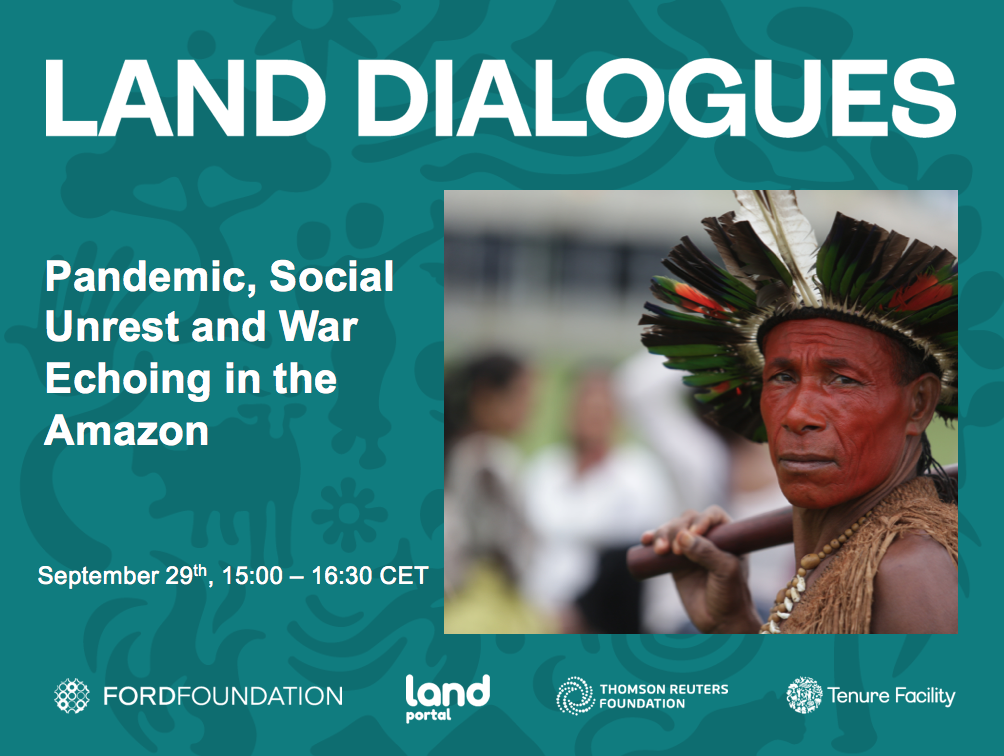Webinar Recap: Pandemic, social unrest and war echoing in the Amazon
OVERVIEW
Following discussions reflecting on COP26 and the nexus of technology and land governance, the third Land Dialogues webinar of 2022 took a broader view at the state of the Amazon. The panel examined the lingering ripple effects of the COVID 19 pandemic, the war in Ukraine, and general social unrest taking place around the world. Indigenous and local leaders from Peru, Colombia, Ecuador, and Brazil discussed how recent global events have put more pressure on natural resources in their territories, affecting their lives and relationship with land.
NOTABLE NARRATIVES:
Lisbeth Alexandra Narváez Umenda, the A’i Cofan community of Sinagoe, Ecuador: When work slowed down during the COVID pandemic, mine workers started broaching our community’s territory for food, in the process polluting territorial waters and spreading a sense of insecurity. People started to fear leaving our homes and drinking water from our usual water sources.
I try to tell people who do not understand my life to try to respect it. They don't understand it, the fear that we feel from big companies that want to destroy our future. But in my community, we are not divided. We are together. We want a future for our kids.
Marcio Halla, the Territorial Governance Facility and Forest Trends’ Communities and Territorial Governance Initiative, Brazil: The current government in Brazil was elected, saying, “We will not demarcate another centimeter of indigenous land.” The government has also been trying to degrade environmental regulation. This rhetoric has emboldened people and companies illegally logging and mining on protected land.
Between 2003 and 2012, the rate of deforestation was reduced six times, and from 2016 17 to the present, the situation was reversed with exponential growth in the rates of deforestation, which made it much more complicated for communities and indigenous peoples to be able to tackle the pandemic and worsened food security.
With the issue of fertilizers. It's interesting to say something about this because in 2020, the current government put a bill to Congress to authorize mining on indigenous lands. In their words, the Ukraine war was an opportunity to pass this bill because 85% of fertilizers used in Brazil are imported mainly from Russia. The importance of potassium for Brazilian agriculture and agribusiness became the main talking point – that we had to mine our own potassium, which a lot of indigenous lands hold.
Astolofo Aramburu, Afro-Colombian leader from the Yurumangi River: As context, it’s important to note that although slavery was prohibited in Colombia in 1852, the black community didn’t have constitutional rights until 1991. So that is where we are starting from.
Silvana Baldovino, director of the Biodiversity and Indigenous Peoples Program of the Peruvian Society of Environmental Law, SPDA: The COVID 19 pandemic brought an eruption of corruption and illegal activities in indigenous territories. Also the prices of oil and gas have increased, and indigenous territories have been harmed. So the challenge is that we need to have more legal security, to have more rights and protect against what has happened in recent years with the pandemic and other situations.
Barbara Fraser, freelance journalist based in Lima, Peru: There is serious historical trauma in the Amazon region that dates back to the arrival of European settlers. Intergenerational trauma from the slave trade, genocides, and the uprooting of communities is something that really hasn't been examined in the Amazon. They have a lot to do with land rights and with persistent colonial attitudes toward land.
If actually implemented, the agreements that came out of the Glasgow Climate Summit (COP26) are going to pour a lot of money into projects in the Amazon. They definitely need to be examined. The wildcard is organized crime. During the pandemic criminal activities expanded throughout the Amazon – illegal mining, logging and drug trafficking. They're all related to money laundering and corruption in the government. These are extremely dangerous issues. But unless unless there is a region wide effort to attack corruption and attack organized crime, it's the local communities that are just going to be caught in the crossfire.
Watch the replay here: https://www.youtube.com/watch?v=ky_LQ4LGr7k
The last and final Land Dialogue for this year will take place in early December. We will share more information with you shortly.

